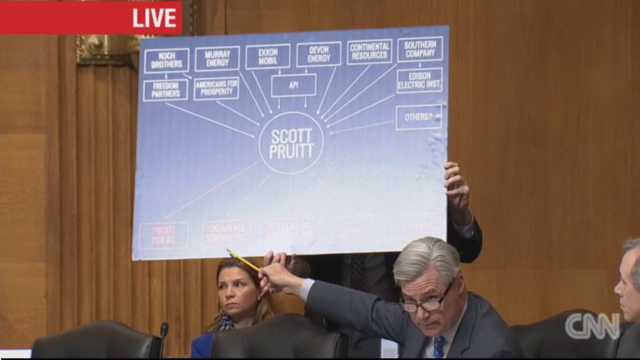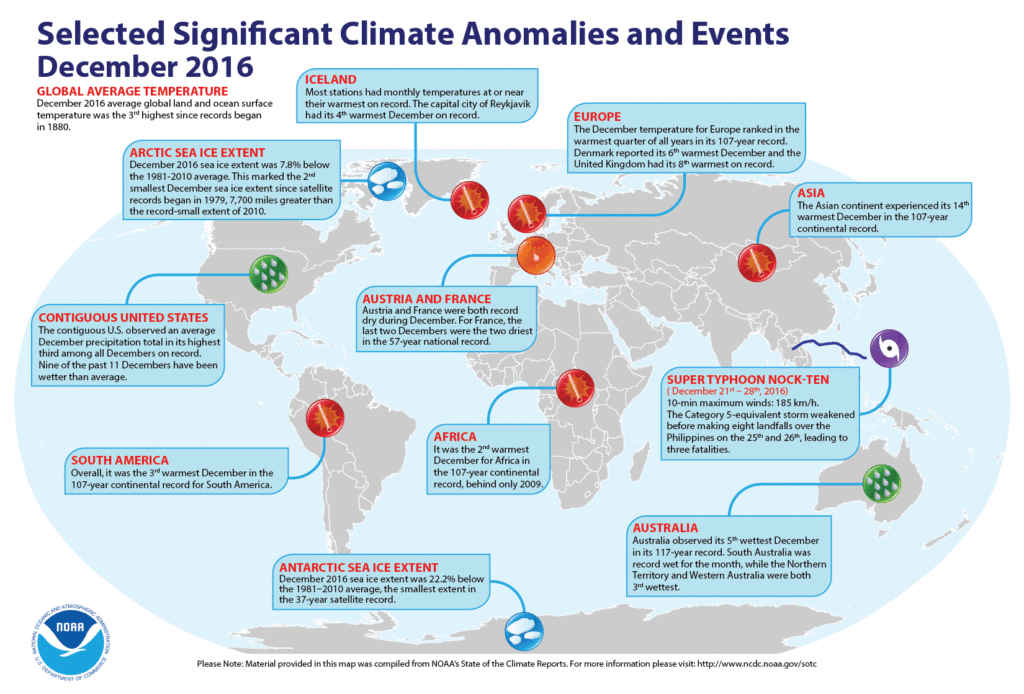
An annual report released today from the National Oceanic and Atmospheric Administration lists 2016 as the hottest year on record, marking three consecutive record-breaking years for global temperatures.
The report’s release coincides with U.S. Senate confirmation hearings for Oklahoma’s Attorney General Scott Pruitt, whom President-elect Donald Trump has nominated to head the Environmental Protection Agency.
Environmentalists have expressed concern that Pruitt’s interests lie mainly in protecting corporations within the energy sector from EPA regulations rather than protecting the people who suffer negative effects from water and air pollution caused by industrial activities.
Meanwhile, supporters of Pruitt claim his aggressive stance against the EPA, in which he has sued the regulatory body 14 times just for matters regarding air quality, represent his ongoing campaign for increasing states’ rights as a champion of federalism.
Findings from the climate report

The NOAA has 137 years of data with which to compare current conditions. Within that context, the following results exhibit some pretty compelling evidence for recently accelerating climate change:
This marks the fifth time in the 21st century a new record high annual temperature has been set (along with 2005, 2010, 2014, and 2015) and also marks the 40th consecutive year (since 1977) that the annual temperature has been above the 20th century average. To date, all 16 years of the 21st century rank among the seventeen warmest on record (1998 is currently the eighth warmest.) The five warmest years have all occurred since 2010.
Overall, the global annual temperature has increased at an average rate of 0.07°C (0.13°F) per decade since 1880 and at an average rate of 0.17°C (0.31°F) per decade since 1970.
In 2016, global temperature averages were 1.69°F above the 20th century global average. The monthly report for December 2016 cites “strong El Niño conditions” in early 2016 followed by “weak La Niña conditions” in the fall as contributing to weather patterns that facilitated record-high temperatures.
Hearings offer rare glimpse of Pruitt
As Oklahoma’s AG, Pruitt has rarely agreed to speak to state and local press regarding ongoing litigation or his political positions in general.
Pruitt was asked this morning whether he believes, as Trump has stated, that climate change is a hoax.
“I do not believe climate change is a hoax,” Pruitt replied.
But later in his hearing, Pruitt was challenged by Sen. Bernie Sanders (I-Vt.) as to whether he believed climate change is man-made.
Pruitt attempted to say that his opinion was “immaterial,” to which Sanders expressed surprise and outrage. But the Oklahoma attorney refused to say that climate change was affected by human behavior.
That was not the only tense exchange between Pruitt and Sanders.
In a story published Tuesday examining Pruitt’s apparent distancing of his office from Oklahoma’s growing earthquake problem, neither the AG nor his office agreed to speak with reporters.
Sanders, however, honed in on the topic. He expressed concern at such arm’s length treatment of a timely environmental issue affecting citizens Pruitt ostensibly has been tasked with protecting.
Regarding Oklahoma’s earthquakes, Sanders asked if Pruitt had made public statements about them. Pruitt stated that the Corporation Commission, not the AG’s office, has jurisdiction over the drilling activities related to Oklahoma’s earthquakes.
“I have acknowledged that I’m concerned,” Pruitt answered after a bit of pressing from Sanders.
“If that’s the kind of EPA administrator you’re going to be,” Sanders chided, “then you’re not going to get my vote.”
The rest of the hearing’s first round largely consisted of Republican members metaphorically patting Pruitt on the back while Democrat members desperately sought to delegitimize the nominee as either uncaring about the environment or too closely affiliated with energy and other corporations to lead the EPA.
‘I need you to know it’
Repeatedly throughout the first half of the hearing, Pruitt referred to “the rule of law” and its importance with regard to how the EPA enforces regulations forged in Congress.
He appeared as a real stickler for the rules, dodging criticisms for perceived inaction on issues by invoking either his office’s lack of jurisdiction or citing clauses within laws that, while failing to remove the perception that conflicts of interest exist between his corporate affiliations and the ostensible purpose of the EPA to protect human lives, do serve to technically absolve his office of impropriety.
Still, it was that cold, calculated defense delivered with lukewarm conviction that worried committee members on the left. Sen. Kirsten Gillibrand (D-N.Y.), near the end of an impassioned line of questioning focusing on pollution of the Hudson River and related negative effects on area residents and the economy there, remained unsatisfied with Pruitt’s ongoing mantra about the importance of the rule of law in helming the EPA.
“I need you also to be worried about human health,” she said. “I need you to know it.”
The ongoing hearing can be accessed here.





















